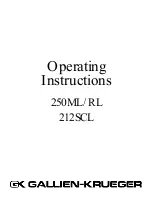
11. OPTIONS AND AUXILIARY EQUIPMENT
11 - 91
11.14 Noise reduction techniques
Noises are classified into external noises which enter the servo amplifier to cause it to malfunction and those
radiated by the servo amplifier to cause peripheral devices to malfunction. Since the servo amplifier is an
electronic device which handles small signals, the following general noise reduction techniques are required.
Also, the servo amplifier can be a source of noise as its outputs are chopped by high carrier frequencies. If
peripheral devices malfunction due to noises produced by the servo amplifier, noise suppression measures
must be taken. The measures will vary slightly with the routes of noise transmission.
(1) Noise reduction techniques
(a) General reduction techniques
Avoid bundling power lines (input/output) and signal cables together or running them in parallel to
each other. Separate the power lines from the signal cables.
Use a shielded twisted pair cable for connection with the encoder and for control signal
transmission, and connect the external conductor of the cable to the SD terminal.
Ground the servo amplifier, servo motor, etc. together at one point. (Refer to section 3.11.)
(b) Reduction techniques for external noises that cause the servo amplifier to malfunction
If there are noise sources (such as a magnetic contactor, an electromagnetic brake, and many
relays which make a large amount of noise) near the servo amplifier and the servo amplifier may
malfunction, the following countermeasures are required.
Provide surge absorbers on the noise sources to suppress noises.
Attach data line filters to the signal cables.
Ground the shields of the encoder connecting cable and the control signal cables with cable clamp
fittings.
Although a surge absorber is built into the servo amplifier, to protect the servo amplifier and other
equipment against large exogenous noise and lightning surge, attaching a varistor to the power
input section of the equipment is recommended.
(c) Techniques for noises radiated by the servo amplifier that cause peripheral devices to malfunction
Noises produced by the servo amplifier are classified into those radiated from the cables connected
to the servo amplifier and its main circuits (input and output circuits), those induced
electromagnetically or statically by the signal cables of the peripheral devices located near the main
circuit cables, and those transmitted through the power supply cables.
Noises produced
by servo amplifier
Noises transmitted in the air
Noise radiated directly from servo amplifier
Noise radiated from the power supply cable
Noise radiated from servo motor cable
Magnetic induction noise
Static induction noise
Noises transmitted through
electric channels
Noise transmitted through power supply cable
Noise sneaking from grounding cable due to leakage current
Routes 4) and 5)
Route 1)
Route 2)
Route 3)
Route 7)
Route 8)
Route 6)
Содержание MR-J4
Страница 9: ...A 8 MEMO ...
Страница 19: ...10 MEMO ...
Страница 73: ...1 FUNCTIONS AND CONFIGURATION 1 54 MEMO ...
Страница 155: ...3 SIGNALS AND WIRING 3 76 MEMO ...
Страница 199: ...4 STARTUP 4 44 MEMO ...
Страница 289: ...6 NORMAL GAIN ADJUSTMENT 6 24 MEMO ...
Страница 335: ...8 TROUBLESHOOTING 8 8 MEMO ...
Страница 357: ...9 OUTLINE DRAWINGS 9 22 MEMO ...
Страница 517: ...12 ABSOLUTE POSITION DETECTION SYSTEM 12 30 MEMO ...
Страница 617: ...16 USING A DIRECT DRIVE MOTOR 16 20 MEMO ...
Страница 641: ...17 FULLY CLOSED LOOP SYSTEM 17 24 MEMO ...
Страница 725: ...18 MR J4 03A6 SERVO AMPLIFIER 18 84 MEMO ...
Страница 763: ...APPENDIX App 38 ...
Страница 789: ...MEMO ...
Страница 793: ......
















































